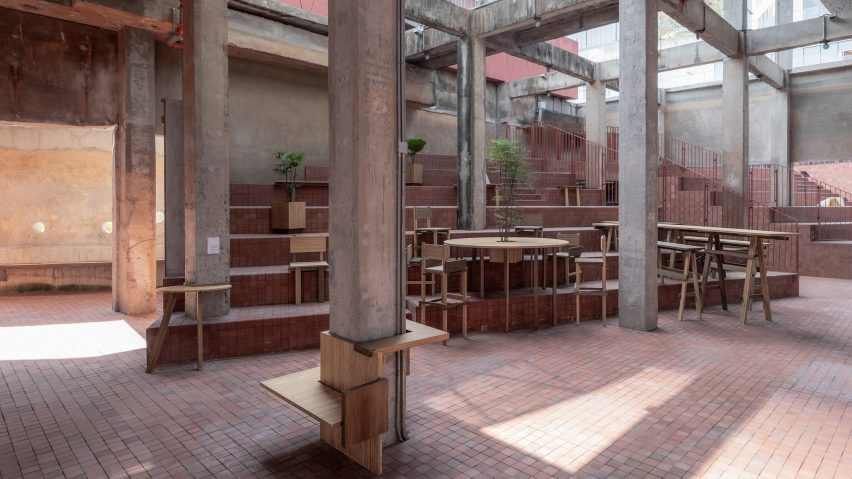Beijing-based BLUE Architecture Studio has created a range of street furniture made from bamboo including seating, tables and accessories that are stabilised by the fabric of the surrounding city.
Named Symbiotic Urban Furniture, the collection comprises benches, chairs, tables and other items that hook over, sit on and lean against steps, railings and other structural elements.
A small-scale iteration of parasitic design – design that relies on existing buildings and structures – the collection depends on the fabric of urban areas to support the furniture, which was deliberately designed without legs and other necessary structural components.
Included in the range is seating, including long and short benches and individual chairs, as well as round tables, long rectangular tables and shelf-like small tables.
The series of items also includes planters to house urban greenery, as well as a notice board that combines shelves and a pegboard.
Despite having different functions, the pieces all share similar features including a simple geometric composition, splayed legs and blocky reinforcements to help them sit against steps and walls securely.
The pieces intend to bridge the gap between modern cities and the people who live, work and visit them by allowing people to congregate in public areas. This was a more commonplace sight in previous decades, according to the studio.
"Most modern cities have gradually lost their local texture and 'protrusions'," said BLUE Architecture. "The interaction between people and cities is no longer as diverse as it used to be."
Each piece is made from laminated bamboo, chosen by the studio for its weather-resistant properties, durability, lightness and sustainable merits.
"The natural feeling of bamboo attracts people to touch and sit down," the studio told Dezeen. "Bamboo is widely used in China and compared to wood, it needs less time to grow – it must be cut periodically for its continuous growth."
Their approachable, simple forms and tactile materiality were designed to make the items engaging and encourage members of the public to interact with them.
"When a handrail which people always pass by meets a small table hanged on it, the handrail becomes an attractive space for people to stop, stay, and have a cup of coffee," continued BLUE.
"When the large rough column is embraced by a chair and a table board, it becomes popular."
Also included in the collection is a seat designed to sit nestled in a corner, making use of awkward and often underutilised space. The seat is enclosed in a canopy and has space beneath lined in fabric that acts as a cosy shelter for cats.
"The furniture relies on the urban spaces, and the urban spaces become lively because of the furniture," the studio concluded.
Symbiotic Urban Furniture was exhibited as part of the ninth Bi-city Biennale of Urbanism/Architecture in Shenzhen, China, from December 2022 to March 2023. The furniture will remain at this site with the intention of people using it for the foreseeable future.
Other urban furniture projects on Dezeen include a convex, curving bench designed to encourage togetherness by Snøhetta and a series of modular street furniture that acts as seating as well as oversized planters for trees and shrubbery by Stefano Boeri.
The photography is by Anson of Araw Culture Communication.
Symbiotic Urban Furniture is on show as part of the Bi-city Biennale of Urbanism/Architecture in Shenzhen. See Dezeen Events Guide for an up-to-date list of architecture and design events taking place around the world.

